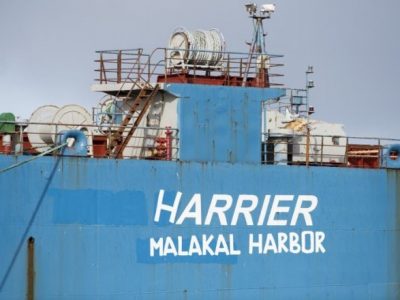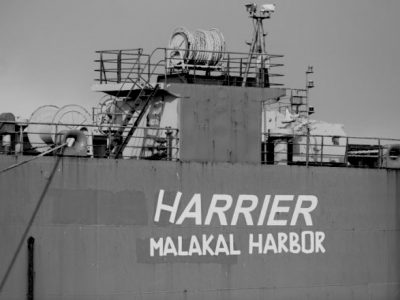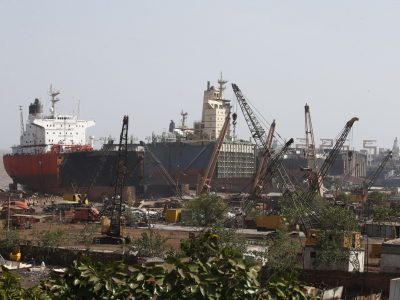The controversial case of the Harrier
It all began with an anonymous letter informing us that the EIDE CARRIER had been sold for scrap. The vessel had been laid up for years on the west coast of Norway, prompting the Platform to immediately contact its owners, the Eide Group, to warn them that exporting the ship to a South Asian beaching yard would violate European waste laws. At the time, Eide Group categorically denied that the vessel had been sold for scrap. Little did they – or we – know what was to follow.
Nearly a year and a half later, in February 2017, the vessel attempted to leave Norway under a new name, new flag, and new registered owner. With just a single letter painted over, the ship was rebranded as the TIDE CARRIER. It now flew the flag of Comoros and was registered under a post-box company in St. Kitts and Nevis called Julia Shipping Inc. These were strong indicators that a cash buyer – a scrap dealer specializing in acquiring end-of-life ships for dismantling on South Asian beaches – had taken over.
Just hours after departing, the vessel’s engine failed. Despite the ship’s poor condition and worsening weather, the new captain, from Nabeel Ship Management, failed to call for assistance. As the TIDE CARRIER drifted perilously close to one of Norway’s most renowned beaches, the coastguard was forced to initiate a salvage operation to prevent grounding and a potential oil spill. The rescue involved evacuating five crew members—one of whom suffered a broken shoulder—and deploying two tugboats to bring the ship to safety.
At the owners’ request, Julia Shipping Inc., the vessel was laid up in Gismarvik. Its name was changed once again, this time to HARRIER, and its flag switched from Comoros to Palau—another flag commonly used for end-of-life ships. The Comoros registry later confirmed to Norwegian authorities that the vessel had never officially been registered under its flag.
The Platform alerted authorities, emphasizing that the vessel had likely been sold to a South Asian beaching yard for scrapping, and that Julia Shipping Inc. was likely acting on behalf of a cash buyer. We also raised concerns that the ship may have been used to store hazardous sludge.
When the Norwegian Environment Agency boarded the vessel, they discovered it was insured for a “break-up voyage” from Norway to Gadani, Pakistan. They also found excessive, unidentified amounts of sludge and fuel oils. A sales contract dated back to summer 2015—when we had first received the anonymous tip—listed Keyur Dave, Chief Financial Officer of the cash buyer Wirana, as the contact for Julia Shipping Inc. It became clear that the repair contract supposedly from the Middle East, provided to Norwegian authorities to avoid scrutiny, was fabricated. As a result, the HARRIER was placed under arrest and prohibited from leaving Norway unless it was to a recycling facility that complied with European and international hazardous waste regulations.
Norwegian authorities pressed charges against the owners for attempting to illegally export hazardous waste and dismissed a legal challenge to the arrest order by Julia Shipping Inc., represented by law firm Wikborg Rein.
After failing to pay lay-up fees in Gismarvik, the HARRIER was relocated to an anchorage off the coast of Farsund, where two crew members remained confined onboard for over a year. Eventually, with the assistance of Norsk Gjenvinning, Wirana obtained approval from both Norwegian and Turkish authorities to dismantle the ship in Aliaga, Turkey. The vessel finally arrived there in August 2018—three years after it was initially sold for breaking. Before departure, Wirana was compelled to pay EUR 700,000 to GMC in Gismarvik for outstanding lay-up costs.
A sign of things to come: en route to Aliaga, the HARRIER caused an oil spill in the Izmir region. Turkish authorities fined the owners USD 300,000 and demanded they cover cleanup costs estimated at USD 4.5 million.
In Norway, the police—led by the financial crimes division—investigated both the ship's owner, Georg Eide, and the cash buyer Wirana.
In November 2020, Mr. Eide was sentenced to six months' unconditional imprisonment for aiding Wirana in the attempted illegal export. The District Court also ordered the confiscation of NOK 2 million in criminal proceeds from Eide Marine Eiendom AS. The Norwegian Court of Appeal upheld the sentence in March 2022, and the Supreme Court rejected a second appeal in June. The final judgment, now available in English, clarifies that whether a ship is sold directly to a scrap yard or via an intermediary cash buyer, the legal consequences remain the same. All involved parties were aware of the ship’s intended fate and the illegality of exporting it for scrapping in South Asia. They also conspired to cover their actions with a fake repair story based in Dubai.
Cash buyer Wirana was fined NOK 7 million for falsifying documents to mislead Norwegian authorities about the vessel's destination and seaworthiness. They agreed to pay the fine without admitting guilt. Marine warranty surveyor Aqualis Offshore and insurance provider Skuld Maritime Agency were also investigated for their roles in the attempted illegal export. Aqualis Offshore had issued two contradictory certificates on the same day—one for a voyage to Pakistan, the other for Dubai. Skuld was involved in arranging the final insurance for the vessel. However, the public prosecutor recently dropped charges and rescinded the penalty notice against Aqualis Offshore for undisclosed reasons.
The HARRIER case exposes the deceptive practices of ship owners and cash buyers. It adds to a growing number of cases where authorities have been misled with false information to evade regulations on the export of end-of-life vessels. It also serves as a stark reminder of the risks involved in doing business with companies that prioritize profits over environmental protection and human safety.
Related news

Platform publishes South Asia Quarterly Update #21
There were a total of 166 ships broken in the first quarter of 2020. Of these, 126 ships were sold to the beaches of South Asia for dirty and dangerous breaking.
... Read More
Press Release – Appeal Court confirms prison sentence for Norwegian ship owner
According to the Appeal Court, having sold the vessel to a middle man and not directly to a beaching yard does not provide for exempting the ship owner from being held liable for having committed an environmental crime.
... Read More
Platform News – Investigations ongoing after Norwegian authorities press charges against owners of Harrier
The HARRIER is still under arrest in Norway after its owners failed to illegally set sail for the dangerous and dirty scrapping yards in Gadani, Pakistan, last… Read More

Platform publishes South Asia Quarterly Update #18
There were a total of 181 ships broken in the first quarter of 2019. Of these, 142 ships were sold to the beaches of South Asia where… Read More


